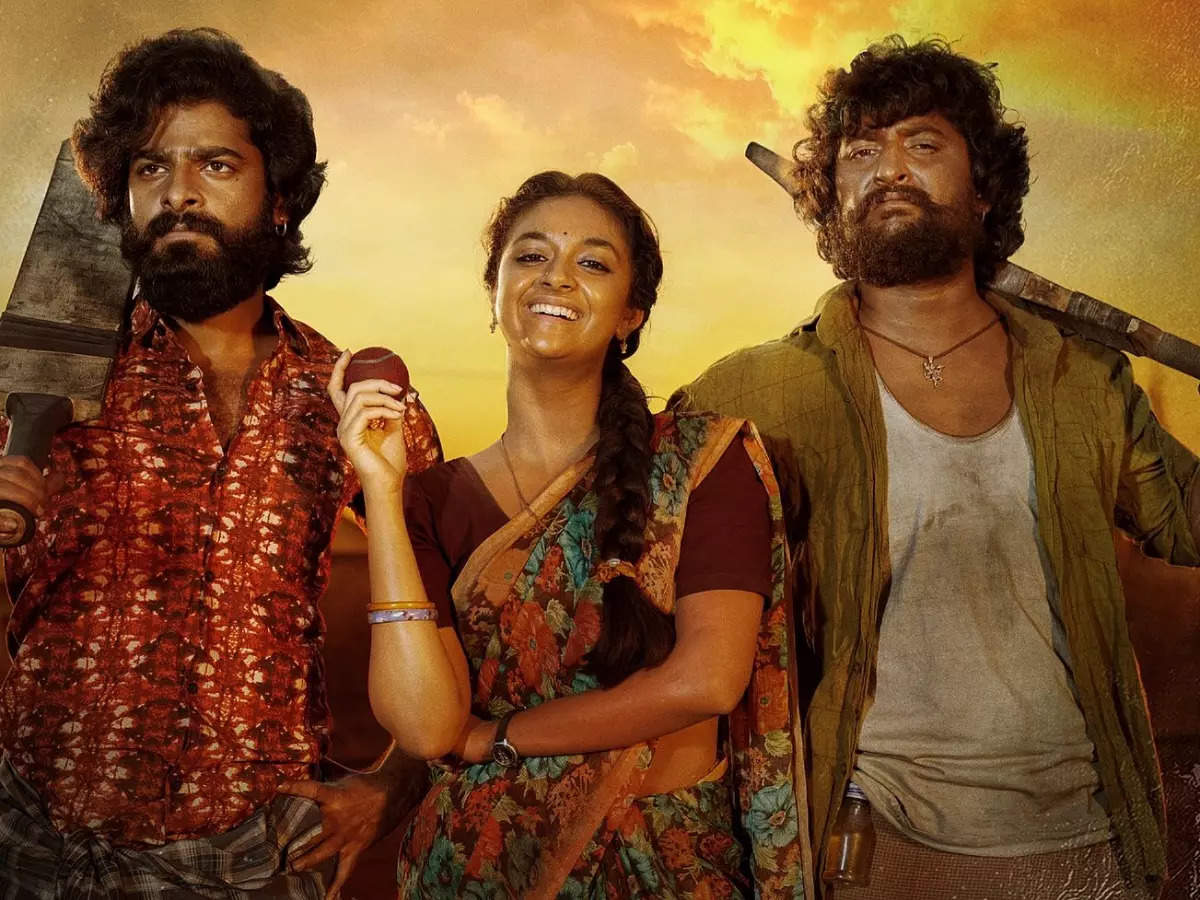Unlike Tamil films which often outwardly explore the themes of caste and power politics wrapped in beautiful stories, Telugu films, especially the massy ones, have been reluctant to deal with such subjects. However, Dasara, written and directed by first-timer Srikanth Odela, starring Nani as Dharani, Keerthy Suresh as Vennela and Deekshit Shetty as Suri is an exception, with a love triangle venturing into the caste and power dynamics of a Veerlapally which is a fictional coal laden hamlet in Telangana.
Amidst the comparisons with the likes of Pushpa and KGF, Dasara is nothing like both. It is outwardly in its attempt to portray the earthiness of rural Telangana and bravely traverses the caste relations and power politics which very few Telugu films like Rangasthalam have explored in recent times.
The film with its story and characters having total gritty fervour strikes a balance between a forthright drama and a high-voltage Masala entertainer. However, in some portions, it feels a little stereotypical in limiting the female agency.
The story is set up in a coal-laden hamlet called Veerlapally, where drinking alcohol is not an addiction but a tradition, a way of life. The men in the village remain doused in alcohol, in a Bar named ‘Silk Bar‘ out of the owner’s love for the beautiful Silk Smitha leaving the women helpless in the village. The Bar is where the caste and power dynamics are set up, where one can see Upper caste men drinking inside the bar, while the lower caste men are forbidden to enter inside.
The Bar is also the undeclared centre of power in the village, where the ownership of the Bar or control over liquor and political dominance in the village are interconnected and hence making it a bone of contention between Rajanna played by Sai Kumar and Shivanna played by Samuthirakani and the latter’s son Chinna Nambi played by Shine Tom Chacko members of the most powerful family in the village. It is important to mention the feud before one dives into the love triangle as the love triangle between childhood friends Dharani, Suri and Vennela has been beautifully situated in between the feud which gives the film a certain balance.
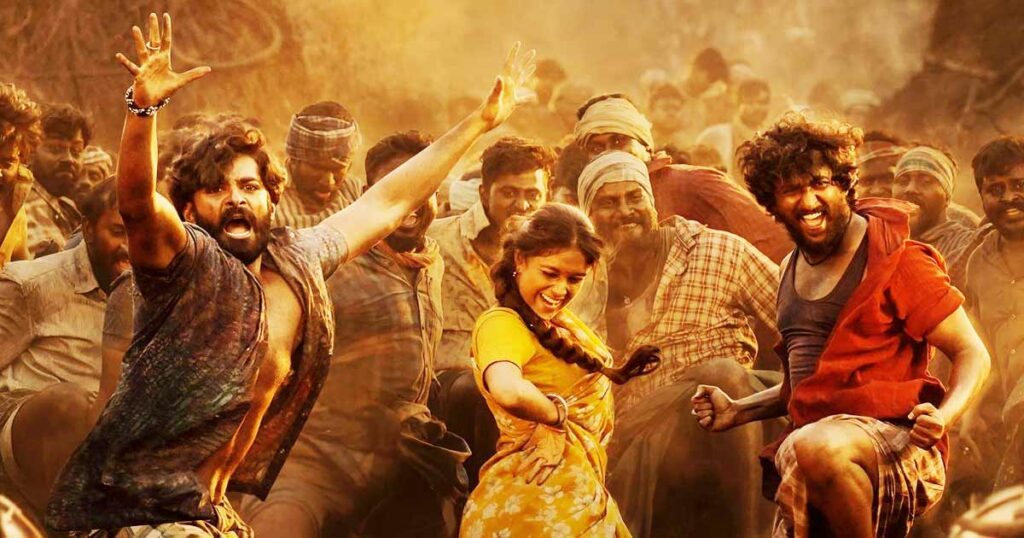
The characters have been named after Earth (Dharani), Sun (Suri) and Moon (Vennela) serving as metaphors for the relationships among them. Dharani as a child fall for Vennela but after realising that his best friend Suri is also in love with her, sacrifices his feelings and hereafter Suri and Vennela’s love blossoms as they grow up.
With his love sacrificed, Dharani and Suri’s friendship also blooms despite both of them belonging to different castes, with the former being a low caste and the latter an upper caste. Their lives come in conflict with the political feud between Rajanna and Nambi, where Dharani and Suri side with Rajanna, and help him in coming to power defeating not just Nambi but also the politics over liquor.
It seems, agitated over this betrayal by Dharani and Suri, Nambi plots to kill Suri and his friends which otherwise could have also been interesting to watch but turns out that Nambi in his lust for Vennela has killed Suri as they both have got married now, much to the disappointment of Nambi.
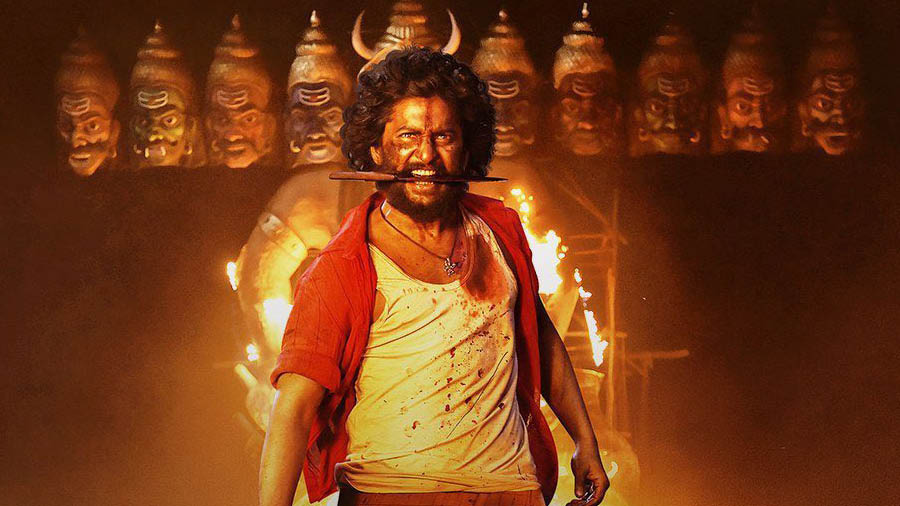
And this is where the otherwise exceptional story falls for the stereotypical attribute of the Masala genre in Telugu films which uses the female bodies and associated honour with it to forward the cause of the protagonist.
Also Read: Dalit Bahujan Representation In Indian Cinema With Focus On ‘Sujata,’ ‘Giddh,’ And ‘Kantara’
The first half of the film sets up the characters in place, whereas the second half of the film goes full throttle in displaying the rage of Dharani through visually appealing action sequences, high voltage drama as well as the vulnerabilities of the characters of Dharani and Vennela.
The beauty of Dasara
The beauty of Dasara lies in its balance. At no point would one feel that the love story is taking up space over the political feud or the other way. Caste relations are well established and portrayed in a raw manner, be it among the village or in between the friendship of Dharani and Suri or amidst the political conflict in the village.
However, when it comes to the love relationship, the caste angle has not been explored in a way to show if it has somehow affected Dharani’s decision to withdraw his feelings for Vennela. The only time caste has mattered in terms of love is when Dharani to protect Vennela from Suri marries her after Suri’s death, but only in a subtle way.
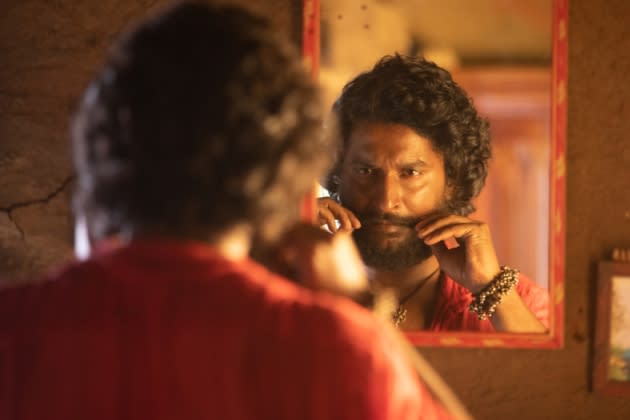
The characters have been well-written. Although the trailer and action sequences would hint at hyper-masculinity running through the film Dharani’s character is so beautifully written that it does not fall into that category. He is not the village strongman trying to protect his people but a naïve and to a certain extent cowardly fellow, who feels liquor is what gives courage to a man. He is indecisive at times and is mostly under the influence of alcohol.
However, when it comes to friendship, he goes all the way out to make his friends happy. Dharani has his vulnerabilities and fears which are beautifully portrayed by Nani in a de-glam avatar. Dharani’s character stays low-key in the first half, but the conflict in the story is what runs rage through his mind and here again, Nani nails it. There is no doubt that this is one of the best characters with an amazing arc that Nani has played till now, the look, and his body language all add to the beauty of Dharani.
Also Read: Film Review: ‘Rekha’ Questions Gender-Based Violence And Abuse
Suri as opposed to Dharani is smart, courageous and outspoken. Deekshit Shetty has portrayed Suri in a potentially powerful manner.
Limiting the agency of Vennela to forward the cause of Dharani’s rebellion
Keerthy Suresh as Vennela is a treat to watch, however, in the next half of the film the arc of the character suddenly drops and this is where Vennela’s agency is limited to forward the story of Dharani’s rebellion against Nambi.
However, Srikanth Odela has tried to give her a say in the movement when she finally speaks up about why her consent was not taken while Dharani marries her to protect her from the lust of Nambi. But here too Dharani steals the show in its portrayal of emotions as he apologises to Vennela for not seeking her consent (which is very unlikely in a Telugu Mass film) although he leaves her question unanswered.
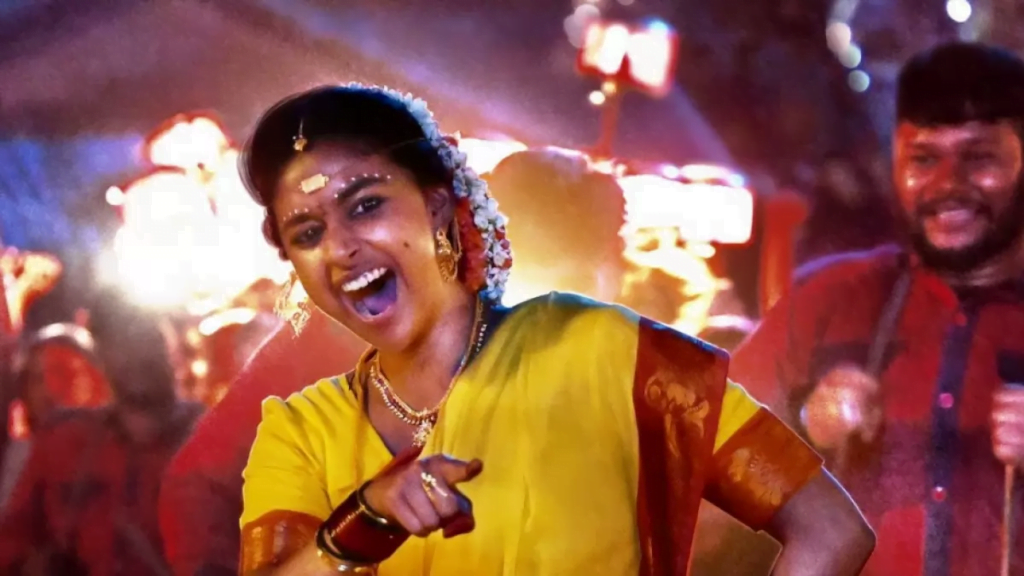
The love between Dharani and Vennela is also not something that has been explored, apart from Dharani’s one-sided feelings for her since childhood. The narrative might seem stereotypical of the masala genre in Telugu films but the character of Vennela is not. She is bubbly, brave and outspoken before the death of her beloved.
Does the film address caste and women’s issues?
As far as women are concerned the film tries to address the concerns of women in connection with men being addicted to alcohol. Their participation in the elections is encouraged keeping in mind their concerns. But nothing otherwise is done, which is not even the need of the script.
When it comes to caste, the approach seems to be balanced. Suri is not typecasted with the saviour complex, neither is the character of Rajanna. The caste equations have been put forth in as much earthy manner as possible which again is a proof of intelligent writing.
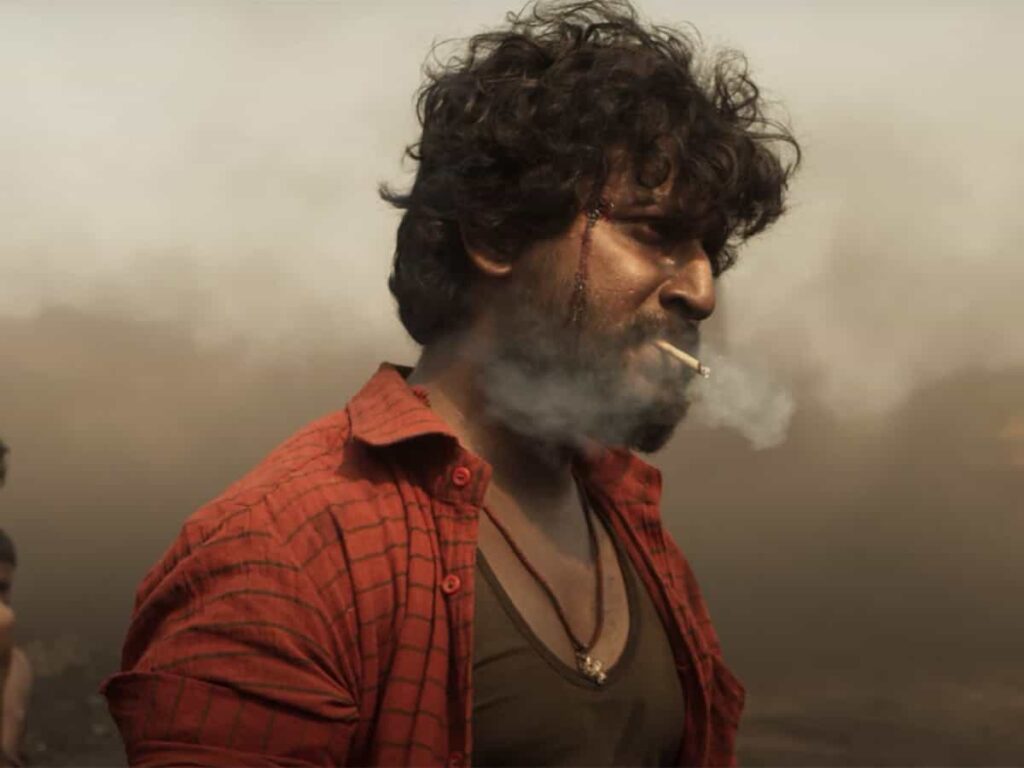
So, overall, Dasara is successful in striking the balance between the portrayal of a rustic drama, be it the love triangle or the political conflict and a mass entertainer appealing to the audiences, with high-voltage action scenes and beautifully crafted landscapes.
Also Read: ‘Vaathi’ Picks Up Complex Issues But Fails At Portraying Possible Solutions
But despite, being beautifully written, limiting the agency of the female lead to forward the cause of the protagonist has made the film certainly lean towards the category of a stereotypical Telugu mass film.
About the author(s)
Preeti Patil is a learning enthusiast. She has completed her master's in Politics with a specialisation in International Studies from Jawaharlal Nehru University. She graduated in Electronics Engineering from RTMNU. Her area of interest is Gender studies, feminist security perspectives, Dalit feminism, Caste & diaspora & affirmative action policies.
